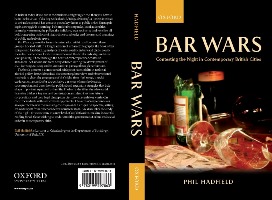Bar Wars (2006)

Winner of the Hart Early Career Book Prize 2007
Reviews
…provides an ideal introduction to the debates raging over the shape and form of the British night-time economy…an important and timely intervention in debates around drinking, nightlife, and the changing moralities of urban consumption…Hadfield’s analysis of licensing procedure was both original and remarkably insightful, and points the way for further ethnographic work on licensing trials, given their huge potential to shape strategy at the local and national levels…Hadfield provides a powerful critique of the existing licensing system and its inability to reflect on, and respond to, evidence relating to criminality in licensed spaces. … His conclusion that an inquisitorial mode of licensing hearing would lead to fairer and more representative licensing decisions is unquestionable”
British Journal of Criminology
“…Phil Hadfield is a prolific and highly engaging writer on Britain’s night-time economy...Bar Wars is a highly recommended tour-de-force…Hadfield systematically unpicks the minutiae of the historical, social, cultural, economic and legal forces which have shaped our contemporary urban spaces at night, and opens up intellectual space for further critical engagement with the consequences of, and possible alternatives to, the commercialisation of British high streets...As public health and public order concerns around British alcohol consumption continue, carefully researched, theoretically innovative, considered accounts of Britain’s night-time economy such as Bar Wars are much needed by those seeking to understand how we find ourselves in this drink-sodden, vomit-splattered mess, and how we may, if not get out of it, at least minimise its harmful effects”
British Journal of Sociology
“An insider's view of the exploitative and occasionally ruthless underbelly of the licensed venues that populate the British 'high-street'…The power plays, the striking of deals, competition for prized locations and the stockpiling of transferable licenses, summon up images of a giant game of monopoly played out on real streets with real hotels and really big dollars…(the author) leaves us in no doubt of his authenticity and personal credentials for writing this book…Timely, intelligently written, supported by insight from personal experience - but tempered with academic rigour -Bar Wars is recommended reading for anyone interested in the inexorable and complex relations between the late-night drinking environment, crime, regulation, governance and policy”
Drug and Alcohol Review
“a useful contribution to the relatively scant canon of literature on the role and importance of licensing and the night-time economy. It is not a legal text and is fairly critical of lawyers. As a result it forces the legal reader to reconsider some of his or her own views and prejudices when one sees the legal profession and process under scrutiny by a non-legal academic observer…I would recommend this book to anyone interested in licensing law”
“With all-night drinking two years old last November, you might like to invest your beer money in a copy of Bar Wars, OUP's excellent new study of the night-time economy in British cities”
Thames View
"At the time of the Act’s implementation much was made of local residents’ potential for representation in licensing hearings. As Phil Hadfield pointed out in his excellent account of the Bill’s passage through Parliament, this was somewhat disingenuous given that the first draft of the Licensing Bill had effectively excluded residents from having influence and concessions were wrung out of the Government as the Guidance to the Act went through successive iterations"
Prof Marion Roberts, Central Cities Institute, University of Westminster
Bouncers (2003) 
Reviews
"Hobbs is without doubt Britain's most insightful and penetrating criminological ethnographer, and he uses his skill to provide an extremely useful service...My advice to all interested academics and students is to get a copy, read it, and keep it as a principal guide book to take with you on your excursions into the subject of professional crime".
International Journal of Sociology and Law
"A ‘state of the art’ study of the emergent career of the bouncer in the burgeoning night-time economy of those towns and cities hard-pressed to maintain their revenue base in the wake of the loss of manufacturing infrastructure … No harm in a fun night out, but 'in the night-time economy, locations that are “bad” for crime and disorder are invariably “good” for business’... This book is written from the frontline of vomit-filled streets and shows how all this has come about."
David Downes, Emeritus Professor of Criminology, London School of Economics
"Succeeds at every level...this is a very good book. It is written with confidence and gusto, in a way which makes the subject come to life."
New Law Journal
"Dick Hobb's research has always traversed the large distance between the criminal and the criminologist and his writing the even larger gap between the novelist and the academic. This has meant that his books are as full of characters as facts and of wry comment as dry analysis and Bouncers is no exception."
The Howard Journal of Criminal Justice
"... a comprehensive account of bouncers: their occupational culture, their role in the alcohol-fuelled expanding night-time economy and the failure of all strata of regulation to contain the violence which is endemic within it."
The Howard Journal of Criminal Justice
"... may be read and enjoyed at a variety of levels ... may also be read with profit by those interested in richly-woven descriptions of the life of doormen, their adventures, their sense of chivalry and of 'rough justice', and the legal and extra-legal codes that govern their conduct ... a serious social study that charms and enthrals."
Law Society Journal
"... a pioneering and exciting study that opens up for police researchers, criminologists, urban ethnographers and sociologists a fascinating look into the night-time economy..."
Theoretical Criminology